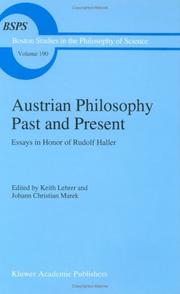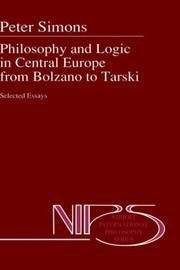| Listing 1 - 6 of 6 |
Sort by
|
Book
ISBN: 3825220869 3851144341 9783825220860 Year: 2000 Volume: 2086 Publisher: Wien WUV-Universitätsverl.
Abstract | Keywords | Export | Availability | Bookmark
 Loading...
Loading...Choose an application
- Reference Manager
- EndNote
- RefWorks (Direct export to RefWorks)

ISBN: 9780792343479 0792343476 Year: 1997 Publisher: Dordrecht : Kluwer Academic Publishers,
Abstract | Keywords | Export | Availability | Bookmark
 Loading...
Loading...Choose an application
- Reference Manager
- EndNote
- RefWorks (Direct export to RefWorks)
Philosophie --- Philosophy, Austrian - 20th century --- Philosophy, Austrian - 19th century --- Haller, Rudolf --- Philosophy, Austrian
Book
ISBN: 9782370840431 2370840439 Year: 2017 Publisher: Caen : Nous,
Abstract | Keywords | Export | Availability | Bookmark
 Loading...
Loading...Choose an application
- Reference Manager
- EndNote
- RefWorks (Direct export to RefWorks)
A travers l'analyse du Tractatus logico philosophicus et des différents langages employés par le philosophe, A. Badiou aborde la question des limites de la pensée, l'assimilation de l'éthique et de l'esthétique, et l'acte antiphilosophique. ©Electre 2018

ISBN: 0792316215 904814129X 9401580944 9780792316213 Year: 1992 Volume: 45 Publisher: Dordrecht : Kluwer,
Abstract | Keywords | Export | Availability | Bookmark
 Loading...
Loading...Choose an application
- Reference Manager
- EndNote
- RefWorks (Direct export to RefWorks)
Philosophy --- Philosophy, Polish --- Philosophy, Austrian --- Logic, Modern --- Philosophie --- Philosophie polonaise --- Philosophie autrichienne --- Logique moderne --- Logique --- --Philosophie --- --Europe Centrale --- --1837-1939, --- -Logic, Modern --- -Philosophy, Austrian --- -Philosophy, Polish --- -#GROL:SEMI-160<09> --- Polish philosophy --- Austrian philosophy --- Modern logic --- Philosophy [Polish ] --- 19th century --- Philosophy [Austrian ] --- 20th century --- Logic [Modern ] --- Philosophy, Polish - 19th century. --- Philosophy, Austrian - 19th century. --- Philosophy, Polish - 20th cnetury. --- Philosophy, Austrian - 20th century. --- Logic, Modern - 19th century. --- Logic, Modern - 20th century. --- #GROL:SEMI-160<09> --- Philosophy, Polish - 19th century --- Philosophy, Austrian - 19th century --- Philosophy, Polish - 20th century --- Philosophy, Austrian - 20th century --- Logic, Modern - 19th century --- Logic, Modern - 20th century --- Europe Centrale
Book
ISBN: 0521007658 0521809800 9780521007658 9780521809801 9780511999918 Year: 2004 Volume: *41 Publisher: Cambridge : Cambridge University Press,
Abstract | Keywords | Export | Availability | Bookmark
 Loading...
Loading...Choose an application
- Reference Manager
- EndNote
- RefWorks (Direct export to RefWorks)
Brentano, Franz --- Philosophy, Austrian --- Philosophie autrichienne --- Brentano, Franz Clemens, --- Brentano, Franz, --- Philosophy [Austrian ] --- 19th century --- 20th century --- Brentano, Franz Clemens Honoratius Hermann, --- Philosophy, Austrian - 19th century. --- Philosophy, Austrian - 20th century. --- Brentano, Franz Clemens, - 1838-1917. --- Brentano, Franz (1838-1917) --- --Philosophie --- Philosophie --- Critique et interprétation --- Autriche --- 19e siècle --- 20e siècle

ISSN: 03448142 ISBN: 9783110189070 3110189070 311089176X 9783110891768 Year: 2006 Volume: Bd. 73 Publisher: Berlin de Gruyter
Abstract | Keywords | Export | Availability | Bookmark
 Loading...
Loading...Choose an application
- Reference Manager
- EndNote
- RefWorks (Direct export to RefWorks)
Paul Feyerabend ranks among the most exciting and influential philosophers of science of the twentieth century. This reconstruction of his developing ideas combines historical and systematic considerations. Part I examines the three main influences on Feyerabend's philosophical development: Wittgenstein's later philosophy, Popper critical rationalism and Ehrenhaft's experimental effects. Part II focuses on Feyerabend's development and use of the notion of incommensurability at the heart of his philosophical critiques, and investigates his relation to realism. Feyerabend initially developed the notion of incommensurability from ideas he found in Duhem. He used the notion of incommensurability to attack many different forms of conceptual conservativism in philosophy and the natural sciences. He argued against many views on the grounds that that they would constrain the freedom necessary to develop alternative points of view, and thereby hinder scientific advance. Contrary to widespread opinion, he was never a scientific realist. Part III reconstructs Feyerabend's pluralistic conception of knowledge in the context of his pluralistic philosophical method. Feyerabend was a philosophical pluralist, who practiced pluralism in pursuit of progress.
Philosophy, Austrian --- Philosophy, Modern --- Science --- Philosophie autrichienne --- Philosophie --- Sciences --- Philosophy --- History --- Histoire --- Feyerabend, Paul, --- Methodology --- Research --- Feyerabend, P. K. --- Feyerabend, Paul Karl --- Feyerabend, Paul --- Humanities Methodology --- Methodology - History - 20th century. --- Philosophy, Austrian - 20th century. --- Philosophy, Modern - 20th century. --- Ancient philosophy. --- Ehrenhaft, Felix. --- Feyerabend, Paul. --- Popper, Karl. --- Wittgenstein, Ludwig.
| Listing 1 - 6 of 6 |
Sort by
|

 Search
Search Feedback
Feedback About
About Help
Help News
News